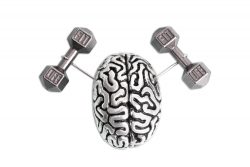 Researchers at Iowa State have uncovered a groundbreaking discovery that the more body fat and less muscle mass we accumulate as we age, the lower our mental agility may become. An aging adult’s physical health can directly impact their cognitive abilities. This exciting development offers new hope for treatments that could help preserve an agile mind in older people who live a sedentary lifestyle or are obese due to natural changes with age.
Researchers at Iowa State have uncovered a groundbreaking discovery that the more body fat and less muscle mass we accumulate as we age, the lower our mental agility may become. An aging adult’s physical health can directly impact their cognitive abilities. This exciting development offers new hope for treatments that could help preserve an agile mind in older people who live a sedentary lifestyle or are obese due to natural changes with age.
The findings from this study provide insight into the importance of body composition for maintaining cognitive health as we age. This research on over 4,000 middle-aged and older participants from the UK Biobank revealed that having excessive fat around the midsection may lead to a decline in fluid intelligence as we age. Greater muscle mass appears to provide protective benefits regardless of chronological age and social standing. These findings offer important insight into how lifestyle factors could contribute positively or negatively towards our cognitive skills throughout life’s different stages.
As we age, our “biological” rather than chronological age becomes a more significant factor in how fluid intelligence can be preserved. Research indicates that around middle-age people tend to naturally experience an accumulation of fat and decreased lean muscle mass. Luckily though, with regular resistance training exercise routines it is still possible for individuals to maintain their muscular strength as they get older, especially for women, who typically have less natural muscle mass than men.
The study explores whether changes in immune system activity can explain the established relationship between fat or muscle and fluid intelligence. It reveals that while a higher body mass index is known to activate the immune system, leading to cognitive difficulties, it remains unclear if fat alone or muscle predominantly initiates this response.
This study found that in women, two types of white blood cells (lymphocytes and eosinophils) were linked to impaired fluid intelligence when abdominal fat increased. In men, a different type of immune cell – basophil – explained about half the connection between fat and lower cognitive performance. Muscle mass seemed protective against this effect, however, there is no conclusive evidence yet as to whether or not body weight can increase one’s risk for Alzheimer’s disease.
As all of us prepare to enter the new year with resolutions, why not add protecting our brain health and fighting Alzheimer’s disease? Recent studies have suggested that maintaining healthy muscle mass while limiting fat mass might be linked to a reduced risk in developing dementia. Your body’s strength could be an indicator of your brain power! Strength training has been associated with improved functions in the frontal lobe, such as better executive functioning. Studies suggest that strength training can lead to healthier white matter atrophy levels in the brain and reduces the effects of obesity on cognition.
Strengthening your muscles is not only important for physical health, but it can also help keep the cognitive powers of your mind in top form. Incorporating strength training into a regular routine may aid in offsetting some age-related mental decline and keeping those thinking skills sharp.
To view the original scientific study click below:
Aging-related changes in fluid intelligence, muscle and adipose mass, and sex-specific immunologic mediation: A longitudinal UK Biobank study





